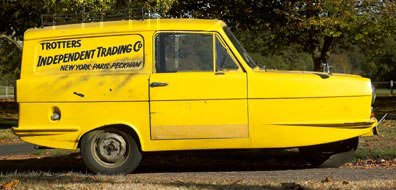DISCO INFERNO
In a true reflection of where rampant shopping gets us, the Beeb has a piece about one man's quest to ditch his high falutin' branded days. In a kind of burn or get burnt antic he's promised to destroy all of his branded kit as a display of his newfound freedom. Is this a first step toward a more sustainable shopping ethic? It's certainly some welcome fashionista honesty.
In a kind of burn or get burnt antic he's promised to destroy all of his branded kit as a display of his newfound freedom. Is this a first step toward a more sustainable shopping ethic? It's certainly some welcome fashionista honesty.
Like many a sad tale of lust and despair, the hard times emerged from early habits:
"Once I had nagged my parents to the point of buying me the shoes I was duly accepted at school, and I became much happier as a result."
In posting previously on the satisfaction of shopping (eg. referring to it as a national pastime), I hadn't considered the happiness that comes not simply from being adorned in Armani, but also from being checked out while festooned in FUBU. Go figure.
The comments that follow the article are predictable enough. Most are of the "don't burn it, you idiot, give it away" persuasion which highlight the obvious flaw in our naked crusaders plan. Just how he intends to get through his life as a "music promoter and style magazine editor" without becoming an outcast remains to be seen.
One thing is for sure, if this brand burning is to be as iconic as 60's bra burning, it's a step forward. Maybe the "give, don't burn" message will get through - a sure winner for goodwill stores.
Thursday, August 31, 2006
Monday, August 28, 2006
LIGHTS ON, NOBODY HOME
Today someone representing a West Island film company turned up at the office I'm working at on Labmton Quay. They gave our desk dude a wonderful letter commencing "Dear Business Owner/Building Manager". How nice.
Apparently:
 But in order "to make Wellington look amazing for the [weekend] shoot":
But in order "to make Wellington look amazing for the [weekend] shoot": One wonders if either the lovely "Mel" (who penned the letter) or her employers, Goodoil Films, have considered that their choice of Wellington may not have been so wise:
One wonders if either the lovely "Mel" (who penned the letter) or her employers, Goodoil Films, have considered that their choice of Wellington may not have been so wise:
- We were "chosen over many major cities in... [Oz&NZ]..." yet in order to "achieve a very big city feel" we've got to flick the switch for an entire weekend.
- Leaving "lights on to give shape and vibrancy to Wellington"? Is "shape and vibrancy" industry speak for "fake"? It's certainly not going to "make it (Wellington) look its very best".
- In Wellington (unlike Paddington, NSW presumably), electricity use comprises a cost to business.
Just why "Wellington City" would do "everything it can to make this [rat arse ad shoot] possible" when we have a perfectly vibrant film community of our own is beyond me. Do they think they're big time? Theirs is simply a smarmy attempt to appeal to civic pride in order to extract a massive freebie.
I wasn't intending to come off all whiney, but tell me: why would we as a city, in an energy constrained country, with a significant amount of electricity still generated by burning fossil fuels, leave all the lights on in our most densely built area out of the goodness of our heart? Just because our last shower of rain was quite hefty doesn't mean we came down with it.
This is a perfect example of an organisation trying shift significant costs of business on to the community. Please, somebody, tell me if I'm out of order, and if so please spell out some benefits of leaving the lights on.
Update: quick calculation: assuming 2.5 days of lighting for half of the CBD core is being requested, and that on average 50% of all power usage is for lighting, then the bill comes to approx. $14,000. I don't have info to hand that allows me to state that in CO2 equivalent emissions, but it would be good to know.
More about: energy, energy efficiency
Posted by
mikeymike
at
7:25 pm
3
comments
![]()
Friday, August 25, 2006
PLASTIC FANTASTIC
In contrast to last weeks “pig ugly” post, Thursdays Queen St events struck me with a strange reminder of the impact of greenwashing. The “boobs on bikes” parade caused a bit of an uproar. At last count David Farrars blog post on the subject had 176 comments (of which I’ve only read three). From my “mainstream” perspective, boobs are indeed a fine thing. Although they come in all shapes and sizes, some are augmented in order to raise the appeal of the person behind them. And that my friends, is where the sustainability similarities arise. A boob-job is most likely boobwashing, and like greenwashing, you’ve gotta be sceptical about what sits behind the brand.
From my “mainstream” perspective, boobs are indeed a fine thing. Although they come in all shapes and sizes, some are augmented in order to raise the appeal of the person behind them. And that my friends, is where the sustainability similarities arise. A boob-job is most likely boobwashing, and like greenwashing, you’ve gotta be sceptical about what sits behind the brand.
There are of course those greenwashers who are blessed with a public front that is naturally appealing. Like a kebab shop – purveyors of healthy square meals but served wrapped in throwaway tinfoil and often only palatable after five pints of lager. And Jessica Simpson who was covered by The Onion last week rampantly promoting her (natural I think) breasts as being her only entertainment credentials.
“…breasts are the leading cause of film careers among women ages 18 to 35.”
Digging down a strata, we see a fundamental difference between Boobs on Bikes and Simpson. As one or two promoters of the bike event said “it’s not about porn” (although it clearly was) “it’s about celebrating breasts”. So while Simpson was merely promoting herself, the bikers were giving a collective high-five for breasts generally. And for that alone I applaud the bikers. According to my boobwash argument, my applause is only valid if breast awareness has positive social outcomes. If the strong male audience was anything to go by the outcomes were quite narrow. Although I was pleased to see that other Queen St events were able to capitalise on the parades' popularity.
According to my boobwash argument, my applause is only valid if breast awareness has positive social outcomes. If the strong male audience was anything to go by the outcomes were quite narrow. Although I was pleased to see that other Queen St events were able to capitalise on the parades' popularity.
It is plain rediculous that a porn show could be promoted to a lunchtime crowd in Queen Street, but it's plain brilliant of the promoters to work the "it's about celebrating breasts" angle. If for nothing else, I'm ecstatic that the parade proved the death of Spike Milligan (pictured) was a hoax.
Posted by
mikeymike
at
5:08 pm
2
comments
![]()
Tuesday, August 15, 2006
"...PIG UGLY, BUT A FAIR SORT" You know it's been a tough news day when Gristmill are on about 1930's inventions - especially when it resembles Peckhams finest means of goods delivery. But maybe, just maybe, there is something in this one:
You know it's been a tough news day when Gristmill are on about 1930's inventions - especially when it resembles Peckhams finest means of goods delivery. But maybe, just maybe, there is something in this one:
"...a car that seats eleven passengers, turns on a dime, has excellent fuel efficiency, and cruises happily at 120 miles per hour."It got me to thinking just how ugly three wheel cars are. Ever since the days of my hotbike I've always wanted to believe three wheels are cool. The "trusty" old reliant of Only Fools and Horses fame did me no favours, and quad bikes have firmly supplanted three wheelers on your average farm. But to be sure, I did some hunting...
And hey presto! The beeb has reported that an EU funded project called "The Clever Car" was due to hit the streets last year. No sign of it yet, but it looks pretty good. In a big city setting the Clever could just carry off the cool angle sufficiently to prompt the image conscious SUV driver to consider it. Names aside, Clever has more than a few similarities to the Carver - which was road tested by Jeremy Clarkson's lot a while back.
Although the Clever is founded on fuel efficiency, both of these two three wheelers (one-one was one too) are traffic congestion beaters and just happen to look all right.
I can rest easy knowing my hotbike days were well spent - there's still some legs left in the old three wheel concept yet...
Posted by
mikeymike
at
8:46 pm
0
comments
![]()
Friday, August 11, 2006
AS SENSITIVE AS ONION
It's Friday and a wink is as good as a nod's as good as a laugh. The Onion, purveyors of shits 'n' giggles for a very long time now, offer some exceptionally sensitive cultural comment in reflecting on high fuel prices. Recently the City of London introduced hydrogen powered busses. I wonder if the arms industry has considered hydrogen propulsion for some of its low end models...? Go on then, go and enjoy your weekend.
The Onion, purveyors of shits 'n' giggles for a very long time now, offer some exceptionally sensitive cultural comment in reflecting on high fuel prices. Recently the City of London introduced hydrogen powered busses. I wonder if the arms industry has considered hydrogen propulsion for some of its low end models...? Go on then, go and enjoy your weekend.
Posted by
mikeymike
at
4:21 pm
0
comments
![]()
Saturday, August 05, 2006
GEAR JUNKIES
This time last weekend I was having lunch atop Mt Ngauruhoe with a few friends. We were all well equipped - prepared for a quick change of weather that can bring danger in such an exposed place. Being well equipped comes within a wide spectrum. Gear junkies and their heavy packs sit toward the compulsive end of the spectrum - the end opposite to the minimalist approach often taken by those of adventure racing pedigree (who obsess about reducing weight).
Being well equipped comes within a wide spectrum. Gear junkies and their heavy packs sit toward the compulsive end of the spectrum - the end opposite to the minimalist approach often taken by those of adventure racing pedigree (who obsess about reducing weight).
In kitting yourself for the outdoors there is clearly an environmental impact. Mt Everest is often referred to as the worlds highest rubbish dump - oxygen canisters, ropes, empty food tins... and that's just what's left behind. The average gear junkies basement is a treasure trove of kit.
I've posted before about the virtues of Yvon Chouinard of Patagonia outdoor, and a few weeks back he received an award for his contributions to environmental protection (hat tip Treehugger). Chouinard was an early proponent of clean climbing and has refined the Patagonia business model to minimise impact. But it's pretty hard to get Patagonia gear here in NZ - their online store doesn't ship it, and there are no outlets.
Over on The Piton, there has been a lot of discussion this week about Hummer sponsoring a large US outdoors trade event; an interesting aside to my post about SUV's last week. The Piton also had a link to ailin.com - who claim to be "the most technically advanced and eco-sensitive [outdoor] brand on the market". All very well and good, but availability in NZ?
It seems that the best Kiwis can do to reduce the gear junkie impact is to buy NZ made. Brands like Norsewear, Swazi, Ground Effect, and Cactus are still made here; but the Cameronising of Fairydown and the offshoring of Macpac and Icebreaker have been well publicised.
A National Radio interview a month or so back featured Icebreaker arguing that the location of manufacturing is not as important destination of profits (not too dis-similarly argued in my earlier post on malls). Some opponents of the Greens Buy NZ Made campaign concur. The argument goes along the lines of "why support low skill NZ manufacturing when it is always going to be cheaper to manufacture offshore... we should be concentrating on high value production." I tend to agree - anyone can be a plodder, but we are good at innovating.
Recently, organisations like the New Zealand Institute and Better by Design have been particularly vocal: differentiate our products so it is natural for Kiwi (and global) consumers to "buy Kiwi owned".
Like food miles, gear miles is a valid concern. So your 1st priority should be to buy NZ made. But if that means you can't get what you need then buy NZ owned and be aware of where it has come from. Failing that buy offshore, but always be aware of the company's environmental position. It's all part of being an intelligent consumer...
More about: nature, outdoors, sport
Posted by
mikeymike
at
11:08 am
2
comments
![]()
Thursday, August 03, 2006
62 ABOVE
Would this speed up or slow down sea level rise? Yesterday the beeb reported that the town of Narsaq in Greenland is melting chunks of its' ice cap to brew beer. That's what I call interesting news! I suspect that if I were to dash down to the offie, grab a case of the stuff, savour it, and emit what the body didn't need; the moa point plant would discharge to sea faster than if it were left in the greenland ice cap. Or is the cap melting so fast that it's no contest?
I suspect that if I were to dash down to the offie, grab a case of the stuff, savour it, and emit what the body didn't need; the moa point plant would discharge to sea faster than if it were left in the greenland ice cap. Or is the cap melting so fast that it's no contest?
A stupid question of course. The key issue is (glass recycling aside) sustainability of water source, and consequently, if I were able to buy it at my local would I be supporting the accelerated destruction of one of the planets life sources?
Are they taking melt water, or are they taking ice? My Kalaallisut isn't so hot, so I have no easy means of getting sustainability info from the brewery website, and the BBC article is of no help.
Berg beer was done around the turn of the century apparently (...ooooh, its sooo last century). But this time round, rather than selling at sipping prices (three stubbies for $26US), this batch looks to be more of a quaffing drop at 5Euros a half litre. So the impact may be a little more substantial.
It was quite timely news for me. Last night I saw The White Planet at the NZ Film Festival. The beauty and fragility of the arctic neck of the woods is all too fresh in the mind. Surely drinking beer from a much needed and melting ice cap is more than a bit excessive...
More about: booze, climate change, nature
Posted by
mikeymike
at
5:04 pm
0
comments
![]()


